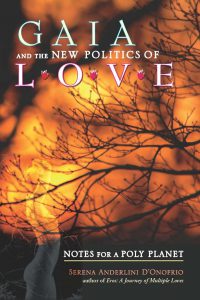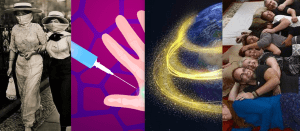Dear Earthlings:
The EcoSex course at U Conn is complete. It was a great experience. We spent time reading amazing books. And here we resume posts to be shared with you. Thinking out of the box and across disciplines. Students had been sending their responses in, with discussion questions. In class, we did connected the dots: a holograph of what we’ve read together, the “required readings.” Multiple perspectives and good synergy. Here, we offer a glimpse. Christopher Ryan and Cacilda Jetha’s Sex at Dawn was one of two cultural-theory theory books. We got five responses: from Adam, Michael, Alexandra, and Rhiann.
Here is Rhiann’s take:
Response to Sex at Dawn
 It states, “the female… with the rarest exception, is less eager than the male…” The authors go on to say that, “hundreds, if not thousands, of studies have claimed to confirm the flaccidity of the female libido” (Ryan 52). A 1989 study done in Florida State University was explained to illustrate where the assumption that women are sexually flaccid derives from. In the study, an attractive college student would walk up to members of the opposite sex and offer a compliment and ask them to go to bed with them that evening. About 75{a9d64f7890d157e71e6efcce19e215a5f853c7f4151cde0b7bf7aada464173f6} of males said yes and many who said no suggested a different night. On the other hand, not one female said yes to the same proposal. This study supposedly concludes that women are not interested in casual sex and do not have a sex drive. The text also suggests that these results are conducive to theories that woman “instinctively barter sex to get things from men” and in order to maintain said value of intercourse they abstain from casual sex (Ryan 52).
It states, “the female… with the rarest exception, is less eager than the male…” The authors go on to say that, “hundreds, if not thousands, of studies have claimed to confirm the flaccidity of the female libido” (Ryan 52). A 1989 study done in Florida State University was explained to illustrate where the assumption that women are sexually flaccid derives from. In the study, an attractive college student would walk up to members of the opposite sex and offer a compliment and ask them to go to bed with them that evening. About 75{a9d64f7890d157e71e6efcce19e215a5f853c7f4151cde0b7bf7aada464173f6} of males said yes and many who said no suggested a different night. On the other hand, not one female said yes to the same proposal. This study supposedly concludes that women are not interested in casual sex and do not have a sex drive. The text also suggests that these results are conducive to theories that woman “instinctively barter sex to get things from men” and in order to maintain said value of intercourse they abstain from casual sex (Ryan 52).
The topic I felt most compelled to respond to in the text, Sex at Dawn, was the section titled, “The Famously Flaccid Female Libido.” The section starts with a quote by Charles Darwin.
 It states, “the female… with the rarest exception, is less eager than the male…” The authors go on to say that, “hundreds, if not thousands, of studies have claimed to confirm the flaccidity of the female libido” (Ryan 52). A 1989 study done in Florida State University was explained to illustrate where the assumption that women are sexually flaccid derives from. In the study, an attractive college student would walk up to members of the opposite sex and offer a compliment and ask them to go to bed with them that evening. About 75{a9d64f7890d157e71e6efcce19e215a5f853c7f4151cde0b7bf7aada464173f6} of males said yes and many who said no suggested a different night. On the other hand, not one female said yes to the same proposal. This study supposedly concludes that women are not interested in casual sex and do not have a sex drive. The text also suggests that these results are conducive to theories that woman “instinctively barter sex to get things from men” and in order to maintain said value of intercourse they abstain from casual sex (Ryan 52).
It states, “the female… with the rarest exception, is less eager than the male…” The authors go on to say that, “hundreds, if not thousands, of studies have claimed to confirm the flaccidity of the female libido” (Ryan 52). A 1989 study done in Florida State University was explained to illustrate where the assumption that women are sexually flaccid derives from. In the study, an attractive college student would walk up to members of the opposite sex and offer a compliment and ask them to go to bed with them that evening. About 75{a9d64f7890d157e71e6efcce19e215a5f853c7f4151cde0b7bf7aada464173f6} of males said yes and many who said no suggested a different night. On the other hand, not one female said yes to the same proposal. This study supposedly concludes that women are not interested in casual sex and do not have a sex drive. The text also suggests that these results are conducive to theories that woman “instinctively barter sex to get things from men” and in order to maintain said value of intercourse they abstain from casual sex (Ryan 52).
My reaction to this passage was negative. I believe the authors would side with me and wrote this passage to shed light upon this assumption. I felt smothered as I read the quotes of these great thinkers. As I read this section, I realized that my personal struggles with my sexuality can be considered a product of these assumptions. The theory that women do not have a strong libido that has been proven by men and weak studies has shaped culture so much that it’s effects are reverberating through my life today. I personally, feel the need to make sure that my “number” of sexual partners is very low because I do not want to be perceived as promiscuous. On the other hand, I struggle with cognitive dissonance. Part of me wants to keep the amount of people I engage in intercourse with low and part of me wants to explore my sexuality. I find myself to a have a sexually open personality but have yet to attempt to explore this because I feel as if there is a societal demand to keep my “number” particularly low. I struggle with these two opposing thoughts all the time. After reading this section, I now realize how deep and old this assumption is that has affected how I perceive myself and monitor my own sexuality. To me, this is unfair to myself and all women. I can only hope that through this class I will start to let go of the societal demands I and other women succumb to on a daily basis.
Rhiann Peterson
Published with permission
WGSS 3998 – Ecosexuality and the Ecology of Love
Prof. Serena Anderlini-D’Onofrio
U Conn, Storrs, Spring 2013
Dear Earthlings:
Let “nature” be your teacher in the arts of love. Education is the heart of democracy, education to love. Come back for more wonders: Students Responses have resumed, to appear now every Tuesday. More Book Reports to be scheduled soon, every other Thursday.
Namaste,
Serena Anderlini-D’Onofrio, PhD
Gilf Gaia Extraordinaire
University of Puerto Rico, Mayaguez
Follow us in the social media
Website: www.serenagaia.com
Author’s Page/Lists all books:
YouTube Uploaded Videos: http://www.youtube.com/
http://polyplanet.blogspot.com












